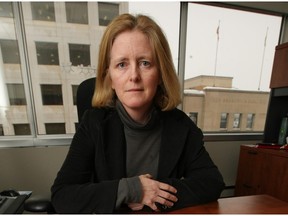Eilish Cleary, former top doc and woman 'of intense courage,' dies
Physician led fight against H1N1 virus and continued advocating for public health, even after her dismissal by the provincial government

Article content
Dr. Eilish Cleary, the outspoken physician who was New Brunswick’s chief medical health officer for seven years, has died after a struggle with ovarian cancer.
Her death on Friday at the age of 60, surrounded by family at Hospice House, was announced in an obituary posted by McAdam’s Funeral Home in Fredericton.
“Eilish believed deeply in access to healthcare for all and worked throughout her entire life to ensure that this was available,” the obituary stated.
A tireless advocate, Cleary was often described as the province’s top doc when she was chief medical health officer from 2008 to 2015, before she was mysteriously fired by the Liberal government of the day.
This was a woman of intense courage and a moral compass that was unshakable.
David Coon
Green party Leader David Coon was friends with Cleary and often consulted with her about public health issues, even after she’d left her position with the province, including what he described as the early “dark days” of the pandemic in 2020.
He visited her recently in hospital before she went to Hospice House.
“So many New Brunswickers respected her for stepping up and fully playing the role of the people’s doctor in looking out for our public health,” Coon said in an interview. “She did that impressively and tenaciously. She was quite willing to speak truth to power to government when it was necessary and she made a huge contribution to this province.”
Cleary led the province’s response to the threat of the outbreak of the H1N1 virus in 2009, ensuring that 400,000 New Brunswickers, or 70 per cent of the population at the time, were vaccinated within a year.
More than 900 clinics had been conducted in mass settings, including evenings and weekends, and it was the second highest vaccination rate in the country, only behind Newfoundland and Labrador. Eight New Brunswickers died from the virus, but it was thought the toll would have been much worse without a more effective campaign.
Dr. Cristin Muecke, New Brunswick’s former deputy chief medical health officer, said she was impressed how hard Cleary had worked to ensure Indigenous communities weren’t left behind in the vaccination campaign.
“She demonstrated on more than one occasion her commitment to put her fellow citizens first, such as lining up with everybody else when it came time to get the H1N1 shot,” she told Brunswick News.
Her public health team wrote a detailed and nuanced 82-page report on shale gas in 2012, when the Tory Alward government controversially wanted to allow fracking. It called for the careful study on the health effects of such development and a more pan-Canadian collaboration on research.
Karen White Masry, an engineer who served in the public health office for a decade, worked closely with Cleary for much of her tenure.
She described her former boss and friend as an energetic mentor to many people such as her.
“She was so passionate about the environment and how what we do impacts the health of the population and how we really need to consider that,” said White Masry, who now runs Avise Consulting in Halifax. “For the shale gas report, we went all over the province together, meeting people, sitting in their houses and talking to them. I learned a lot.”
Cleary travelled to Africa twice, in 2014 and 2015, to combat outbreaks of the deadly Ebola virus, an infectious disease that causes hemorrhagic fever, putting in six months during her last tour of duty in Nigeria and Sierra Leone.
“It was extraordinary,” Coon said. “This was a woman of intense courage and a moral compass that was unshakable.”
White Masry noted that Cleary had spent many years in northern Manitoba before coming to New Brunswick, working in an Indigenous community.
“She was really interested in some of the places that don’t necessarily have the best services and finding ways to make health care more equitable.”
But it was Cleary’s dismissal from her job in December 2015, after she had told people her office was embarking on a study of the health effects of industrial herbicide spraying, that generated months of headlines and speculation.
Brian Gallant’s Liberal government provided no reasons to the public for her firing, but insisted it was a human resources issue and wasn’t related to herbicide spraying, widely used by the tree-cutting industry, NB Power, the military and farmers. The Liberals acknowledged she had been terminated without cause, that a settlement had been paid and both sides had agreed to a confidentiality agreement.
Cleary was mostly silent about her termination, only saying that it was a troubling experience.
Despite the setback, Cleary continued her career as a physician and from time to time spoke out publicly on public health issues of the day.
In May 2018, following a historic flood that forced 2,000 people to evacuate their homes along the St. John River and its tributaries, she questioned whether governments had done enough to prevent problems such as flood contamination or another SARS epidemic.
“The need for strong environmental impact assessments and watershed protection is important because looking at contamination of river water after the fact is a heartbreaking situation for people, with a lot of damage done,” she told Brunswick News, calling for better planning.
She was also critical of the provincial government for what she called the promotion of recreational marijuana when pot was legalized in 2018, writing a commentary piece for Brunswick News outlining her concerns that it hadn’t sufficiently warned of the dangers.
When the pandemic hit, she again spoke up, first in October 2021 when the province removed many restrictions. She argued vaccination rates remained too low among health care and long-term care workers, teachers and school staff.
She wanted to make sure that people knew what they needed to do to be healthy and what services needed to be available.
Karen White Masry
In March 2022, she questioned why more people didn’t have better access to the gold-standard PCR tests that could help stop people from unknowingly spreading the contagion.
“She wanted to make sure that people knew what they needed to do to be healthy and what services needed to be available,” White Masry said. “She was also challenging, and smart as a whip. So you had no choice to be on your toes.”
Premier Blaine Higgs told reporters in Saint John on Monday he was saddened to hear the news of Cleary’s death.
“She was, I would say, a very respected individual within our community and certainly in her role as chief medical health officer. So it’s a loss to New Brunswick.”
Born and raised in Ireland, Cleary became that country’s youngest doctor at the age of 22, before moving with her family to Canada in 1998, first working in Manitoba in Norway House Cree Nation and then New Brunswick.
She’s survived by her first husband, award-winning Irish writer Gerard Beirne, and her four children, James, Luke, Sorcha, and Cormac. More recently, she lived with her partner Paul Meyer in Penniac, where they shared a passion for the outdoors.
White Masry was happy she was able to spend a few moments with her friend last summer in Halifax.
“We walked along the boardwalk, overlooking the water. We shared a love of the outdoors. And it was just so lovely to have a last time, just the two of us.”












Postmedia is committed to maintaining a lively but civil forum for discussion. Please keep comments relevant and respectful. Comments may take up to an hour to appear on the site. You will receive an email if there is a reply to your comment, an update to a thread you follow or if a user you follow comments. Visit our Community Guidelines for more information.